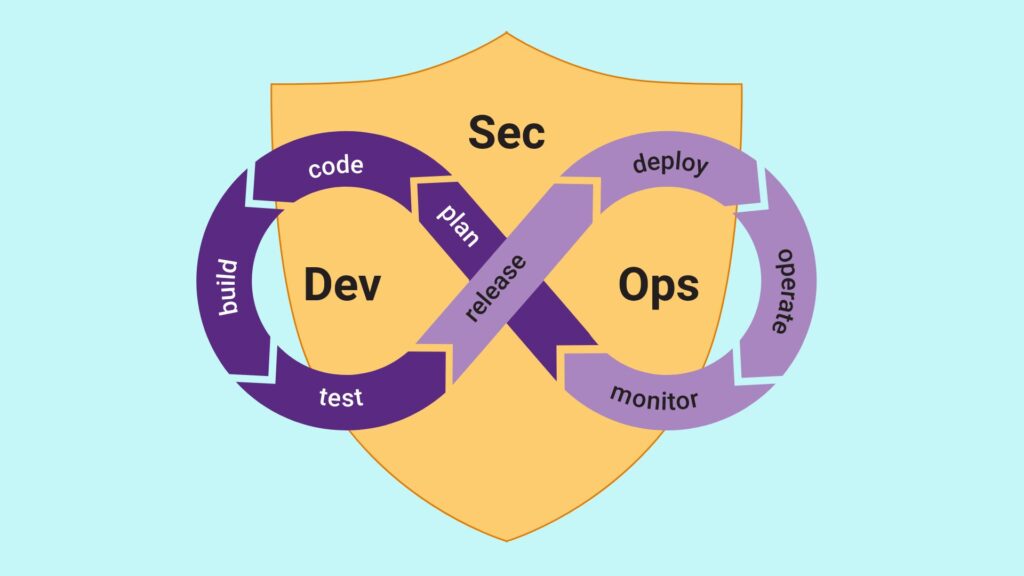



DevSecOps is the next step in software development. It’s a way of working that combines DevOps and security teams, and it’s essential for your career in 2023.
DevSecOps is the next step in software development. It’s a way of working that combines DevOps and security teams, and it’s essential for your career in 2023.
DevSecOps stands for development, security, and operations.. DevOps isn’t just about development and operations teams. If you want to take full advantage of the agility and responsiveness of a DevOps approach, IT security must also play an integrated role in the full life cycle of your apps.
DevSecOps means thinking about application and infrastructure security from the start. It also means automating some security gates to keep the DevOps workflow from slowing down.
DevSecOps stands for development, security, and operations.. DevOps isn’t just about development and operations teams. If you want to take full advantage of the agility and responsiveness of a DevOps approach, IT security must also play an integrated role in the full life cycle of your apps.
DevSecOps means thinking about application and infrastructure security from the start. It also means automating some security gates to keep the DevOps workflow from slowing down.
DevSecOps helps to eliminate time-consuming cybersecurity tasks by seamlessly integrating them into the organization’s CI/CD pipeline.. DevSecOps shortens development cycles. Shorter development cycles allow teams to respond to and fix problems faster, increase efficiency, test new features, and keep users happy. Shorter development cycles also help to strengthen your team and improve their efficiency.
DevSecOps also helps software developers create better products that meet users’ needs.
DevSecOps helps to eliminate time-consuming cybersecurity tasks by seamlessly integrating them into the organization’s CI/CD pipeline.. DevSecOps shortens development cycles. Shorter development cycles allow teams to respond to and fix problems faster, increase efficiency, test new features, and keep users happy. Shorter development cycles also help to strengthen your team and improve their efficiency.
DevSecOps also helps software developers create better products that meet users’ needs.
You can expect to see DevOps and security teams working more closely together.
The rise of DevSecOps means developers are now responsible for securing their code. This isn’t just something they’re doing alone—it’s part of their job description and how they should think about security when building apps.
Security teams will also have a closer relationship with developers in general: they’ll need to know what kinds of tools are helpful to make sure that sensitive data stays safe from hackers, but also how best practices from other parts of IT (such as infrastructure) apply here too (see below).
You can expect to see DevOps and security teams working more closely together.
The rise of DevSecOps means developers are now responsible for securing their code. This isn’t just something they’re doing alone—it’s part of their job description and how they should think about security when building apps.
Security teams will also have a closer relationship with developers in general: they’ll need to know what kinds of tools are helpful to make sure that sensitive data stays safe from hackers, but also how best practices from other parts of IT (such as infrastructure) apply here too (see below).
In the years to come, DevSecOps will be more and more critical. The need for DevSecOps skills is increasing as companies realize they can improve security, quality, and speed by applying DevSecOps principles within their development process.
The future of software development is about bringing together different teams within a company to collaborate on projects by sharing knowledge across boundaries. This means developers need new skills to work effectively with other departments, such as security or quality assurance (QA).
In the years to come, DevSecOps will be more and more critical. The need for DevSecOps skills is increasing as companies realize they can improve security, quality, and speed by applying DevSecOps principles within their development process.
The future of software development is about bringing together different teams within a company to collaborate on projects by sharing knowledge across boundaries. This means developers need new skills to work effectively with other departments, such as security or quality assurance (QA).
Security teams have a lot of things to do, and they often need more time and/or resources to do them.. Security teams need to work with developers, operations engineers, and other IT staff who are involved in managing the eneterprise security environment,. They also need to coordinate with customers, vendors, internal users, and others to understand the business use cases on deploying new technology.
Security teams work with additionalstakeholders who may not be directly related to their own organization’s cybersecurity efforts: legal counsel; product management; marketing departments; sales teams (both internal and external); customer support representatives—and more! All these individuals are essential in ensuring your organization continues providing high-quality software products without compromising its security policies or practices.
Security teams have a lot of things to do, and they often need more time and/or resources to do them.. Security teams need to work with developers, operations engineers, and other IT staff who are involved in managing the eneterprise security environment,. They also need to coordinate with customers, vendors, internal users, and others to understand the business use cases on deploying new technology.
Security teams work with additionalstakeholders who may not be directly related to their own organization’s cybersecurity efforts: legal counsel; product management; marketing departments; sales teams (both internal and external); customer support representatives—and more! All these individuals are essential in ensuring your organization continues providing high-quality software products without compromising its security policies or practices.
It’s about improving security by making it easier for developers and testers to collaborate on single or multiple projects simultaneously. This means you can have your developers write code in an environment that includes automated testing tools, so they can focus more on building quality software than worrying about security issues later on.
By combining development and operations teams into one organization (or even multiple organizations), DevSecOps helps companies reduce costs while increasing efficiency by eliminating duplication throughout their IT departments—without sacrificing quality control over what gets released into production environments!
It’s about improving security by making it easier for developers and testers to collaborate on single or multiple projects simultaneously. This means you can have your developers write code in an environment that includes automated testing tools, so they can focus more on building quality software than worrying about security issues later on.
By combining development and operations teams into one organization (or even multiple organizations), DevSecOps helps companies reduce costs while increasing efficiency by eliminating duplication throughout their IT departments—without sacrificing quality control over what gets released into production environments!
We’re seeing a lot of buzz around DevSecOps and its impact on the software development industry. As the demand for DevSecOps professionals grows, we expect to see more companies adopting this software development method. In addition, more organizations will be looking to integrate DevOps into their existing processes as they realize how much faster they can become when using these methods.
We’re seeing a lot of buzz around DevSecOps and its impact on the software development industry. As the demand for DevSecOps professionals grows, we expect to see more companies adopting this software development method. In addition, more organizations will be looking to integrate DevOps into their existing processes as they realize how much faster they can become when using these methods.





